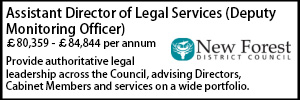Report to mark 25th anniversary of standards watchdog warns of importance of managing relationships between public and private sectors
- Details
The need to manage new relationships between public and private sectors has the potential to put further pressure on the Civil Service and local authorities, a report commissioned by the Committee on Standards in Public Life to mark its 25th anniversary has said.
The report, British Standards Landscape: A mapping exercise, suggested that the media were increasingly exposing examples of poor practice in this area, “which at present the institutional set up appears to be poorly equipped to monitor and manage”.
The CSPL report also identified other new and emerging challenges that the standards regime would in the years to come be required to negotiate: “from the increasing political divisions in society and reported levels of intimidation in public life, to the rise of new technologies and the risks they pose to democratic processes”.
It warned that these were likely to be particularly severe in election periods, “when the capacity of state institutions to monitor online election campaigns and the financing of these campaigns is stretched”.
It added that the steady growth of lobbying and campaigning between elections was also likely to continue, and the system appeared “to be only belatedly getting to grips with the problem”.
The report also said that:
- The recent recognition of bullying, harassment and sexual harassment in Parliament demonstrated the way in which public institutions were part of the wider social and cultural environment, where expectations change and behaviours that might previously have been left unacknowledged were no longer tolerated. “As the independent inquiries into the problem have made clear, not only does Parliament require new mechanisms for complaints and sanctioning, but also that cultural change is required to ensure that staff and MPs alike are protected from oppressive and disrespectful treatment.”
- The broader context in which public life takes place and the blurring of the lines between the public and private sector — particularly in the provision of public services — had provided further impetus for change. “This has had particular implications for the Civil Service, where management processes and ways of working have transformed over the last 30 years; posing new ethical challenges as individuals move between the private and public sector more frequently and private organisations take on responsibility for providing public services. The codification of rules and standards is a response to these changing institutional cultures and the increased emphasis on efficient service delivery.”
- Overall, the British system had responded to many of the integrity challenges it had faced over the last 25 years; frequently following the advice and innovations proposed by the Committee on Standards in Public Life. "And yet, while it is likely that these changes have had a positive impact on integrity in the system, levels of public trust in public standards have tended to remain low or even decline over time. While there are multiple reasons for negative public attitudes, including the effects of scandals, increased scrutiny, and the gaps left in the evolving regime, at the very least this trend suggests a need to model integrity more clearly to the public. In other words, in this modern world in which information is easily come by and easily shared, being seen to do the right thing is perhaps almost as important as doing it, if these systems that run on trust are to survive.”
The CSPL report suggested that high standards in public life were essential because they formed the bedrock of both democracy and justice, and failure to protect them had the potential to undermine the system entirely.
It said that recent controversies appeared to demonstrate a disconnect between public expectations and political practice, and also raised the thus far unresolved question about the reasonable limits that could be imposed by bureaucratic institutions on democratically elected bodies and individuals. “However, in our political institutions, the rising awareness that cultures of bullying and harassment are not only damaging to individuals, but also affect the quality of government and decision-making, suggests the potential for significant positive change at the centre of power.”
The report continued: “Change in this area continues apace and improvements are frequently proposed and implemented to address new concerns and to fill regulatory gaps. This is unlikely to slow in the coming years, as the UK’s exit from the European Union raises new and unprecedented challenges for standards regulators.
“Time will tell what impact the current political situation will have on the standards landscape, but it is clear that there continue to be both complex and emerging ethical challenges that require a balanced and thoughtful approach in order to protect the public interest and maintain public trust.”
Legal Director - Government and Public Sector
Head of Legal
Locums
Poll






















